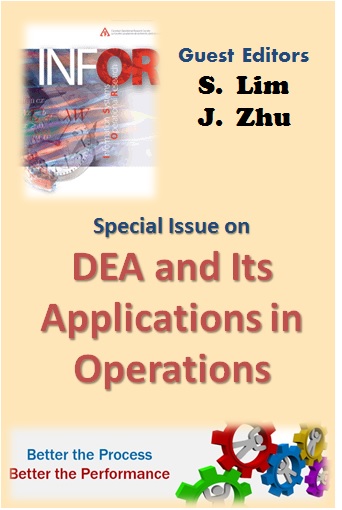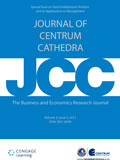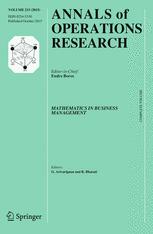Joe Zhu is a guest editor of the following journal special issues:
V. Charles, J. Aparicio & J. Zhu (eds): Data Science for Better Productivity, Journal of the Operational Research Society, Volume 72 (2021) Issue 5
 Today’s global competition and rapid development of information technology has led to the creation of massive amounts of data that are,
moreover, exponentially increasing day by day. Analysing these large data sets is a key basis of competition and innovation,
and supports new waves of productivity growth. This has challenged organizations to find novel ways to analyse and use the
data to make more intelligent decisions and increase their productivity. Data Science, encompassing a collection of
scientific methods, processes, and systems, is one of today's most interesting fields of research and
allows organizations to extract knowledge or insights from these existent mountains of data.
As such, PRODUCTIVITY ANALYSIS/DATA ENVELOPMENT ANALYSIS and DATA SCIENCE/BIG DATA are areas of growing interest to researchers
and practitioners alike, with a significant body of research focusing on either of them.
It is, nevertheless, not too bold to say studies dedicated to addressing both the fields at the same time are rather scarce.
Today’s global competition and rapid development of information technology has led to the creation of massive amounts of data that are,
moreover, exponentially increasing day by day. Analysing these large data sets is a key basis of competition and innovation,
and supports new waves of productivity growth. This has challenged organizations to find novel ways to analyse and use the
data to make more intelligent decisions and increase their productivity. Data Science, encompassing a collection of
scientific methods, processes, and systems, is one of today's most interesting fields of research and
allows organizations to extract knowledge or insights from these existent mountains of data.
As such, PRODUCTIVITY ANALYSIS/DATA ENVELOPMENT ANALYSIS and DATA SCIENCE/BIG DATA are areas of growing interest to researchers
and practitioners alike, with a significant body of research focusing on either of them.
It is, nevertheless, not too bold to say studies dedicated to addressing both the fields at the same time are rather scarce.
This Special Issue encourages original research papers of high quality that focus on novel ways of using the existent data science techniques and/or the development of novel data science techniques to improve and/or unleash value and drive productivity from large data sets, and with practical applications in various domains. Empirical research studies, as well as the development of new or modified methodologies to address challenging and emerging issues in DATA SCIENCE/BIG DATA and PRODUCTIVITY ANALYSIS/DATA ENVELOPMENT ANALYSIS, are of considerable interest. Contributions from both the academic and the practitioner communities are encouraged.
This special issue appears in Journal of the Operational Research Society, Volume 72 (2021) Issue 5.
E. Gonzalez, J. Zhu, S. Zanoni & N. Maculan (eds): Trends in Operational Research Approaches for Sustainability, European Journal of Operational Research, Vol. 269, Issue 1, 2018

How to balance economic, environmental and social impacts generated by climate change is one of the central issues addressed by sustainability. Those impacts are the major challenges faced for every company and institution in the world if they wish to survive and prevail competitive. In this setting, managers are aware that there are a lack of mathematical models and solution approaches, and in particular, operational research (OR) approaches, to properly address a wide variety of problems in the sustainability domain such as energy and water usage efficiency, scarce resource management, reverse, recycling, remanufacturing and waste management, reducing carbon emissions, disaster management, and emerging problems such as migration crisis management . Traditional strategic, tactical and operational problems frequently studied by practitioners and researchers of OR need to be revised, revisited and studied in this new perspective to generate a new and enhanced body of knowledge able to tackle the needs for a sustainable society. Scheduling, Vehicle routing, Facility Location, Supply Chain Design, Warehouse Management, Capacity Expansion and Production Planning Problems, are some of the classical OR problems where mathematical models and solution methods have to integrate all three sustainable perspectives.
During the last 20 years, sustainability concept has been evolving and current literature is rich of conceptual, qualitative and quantitative studies addressing the questions of sustainability. Howbeit there is a need to go beyond, to extend current mathematical models and built new ones that effectively address the challenges posed by sustainability, and to develop algorithms able to handle the computational complexity of this new set of problems.
This special issue has the objective to compile cutting-edge research on mathematical modelling and solution methods to generate a new body of knowledge to assist policy and decision-makers in the pathway of constructing a sustainable society. Researchers should consider this special issue as a unique opportunity to advance the understanding of the OR Community and to incentive a broader group of researchers to make outstanding contributions to achieve sustainability.
Interested authors are challenged and encouraged to modify, expand present theories and to develop a new body of knowledge that mitigate climate change and support the transition towards a more sustainable society. Therefore, high-quality papers, which propose new theoretical insights, develop new conceptual frameworks, create new solution approaches and examine emerging practices, are welcomed. Methodologies to address complex problems should be built upon OR tools and techniques.

Special Issue Editors
The Editors of this special issue of EJOR are:Ernesto DR Santibanez Gonzalez (Managing Guest Editor, Universidad de Talca/Federal University of Southern Bahia, santibanez.ernesto@gmail.com)
Joe Zhu (Worcester Polytechnic Institute, jzhu@wpi.edu)
Simone Zanoni (Università degli Studi di Brescia, simone.zanoni@unibs.it)
Nelson Maculan (Federal University of Rio de Janeiro, maculan@cos.ufrj.br)
This special issue appears in European Journal of Operational Research, Vo. 269, Issue 1, 2018
S. Lim and J. Zhu (eds): DEA and Its Applications in Operations, Part I & II, INFOR, Vol. 55 & 56, Issue 3, 2017 & 2018
 We invite theoretical and empirical contributions to a special issue in INFOR:
Information Systems and Operational Research on “DEA and its applications in operations”.
This special issue aims to compile state-of-the-art research papers spanning models, theory,
empirical studies, applications, and case studies on DEA applied in manufacturing as well
as service operations. We seek contributions that can provide methodology advances,
new and valuable insights and implications to the practice of DEA for performance evaluation and benchmarking
in all fields of operations, governance & management. Potential topics may include but are not limited to:
We invite theoretical and empirical contributions to a special issue in INFOR:
Information Systems and Operational Research on “DEA and its applications in operations”.
This special issue aims to compile state-of-the-art research papers spanning models, theory,
empirical studies, applications, and case studies on DEA applied in manufacturing as well
as service operations. We seek contributions that can provide methodology advances,
new and valuable insights and implications to the practice of DEA for performance evaluation and benchmarking
in all fields of operations, governance & management. Potential topics may include but are not limited to:- New DEA models and their theoretical properties
- Network DEA
- DEA models with undesirable factors
- ntegration of DEA with other OR/MS techniques
- Strategic issues in operations and decision-making with DEA
- DEA as an auditing and evaluation tool
- Health care
- Energy and environment
- Sustainable development
- Agriculture
- Financial sectors
- Technological innovation
- Transportation
- Supply chain management
- Data mining
- Others

Special Issue Editors
Professor Sungmook Lim, Dongguk Business School, Dongguk University, Seoul, South Korea.Professor Joe Zhu, Foisie School of Business, Worcester Polytechnic Institute, Worcester, MA 01609 USA.
Part I of this special issue appears in INFOR, Vol. 55, Issue 3, 2017
Part II of this special issue appears in INFOR, Vol. 56, Issue 3, 2018
C. Chen, S. Zhou and J. Zhu (eds): New Research Frontiers in Sustainability, OMEGA, Vol. 66, Part B, 2017
 Sustainable operations have received significant attention from both academia and industry since the early 2000s.
Driven by consumers increasing environmental consciousness and the regulatory initiatives established by governments around the world,
most companies today recognize the sustainability imperative that is critical to their long-term survival and success.
The most common approach adopted to deal with sustainability issues thus far is the so-called low-hanging fruit
strategy, i.e., implementing those sustainability practices which also reduce costs and/or
improve operational efficiency, such as reducing scrap, reusing wastewater, and improving energy efficiency.
However, recent evidence shows that the low-hanging fruit approach has eventually reached its limit due to
the continuously tightened regulations and rising consumer demand on sustainability. Therefore, it is time
for todays companies to refocus and engage in the development of new products, processes, and business models
in order to tackle the difficult operational, strategic, and social tradeoffs along the triple bottom line (TBL)
dimensions: profit, people, and planet. New applications of management science will play a crucial role in
dealing with this emerging challenge to achieve sustainability.
Sustainable operations have received significant attention from both academia and industry since the early 2000s.
Driven by consumers increasing environmental consciousness and the regulatory initiatives established by governments around the world,
most companies today recognize the sustainability imperative that is critical to their long-term survival and success.
The most common approach adopted to deal with sustainability issues thus far is the so-called low-hanging fruit
strategy, i.e., implementing those sustainability practices which also reduce costs and/or
improve operational efficiency, such as reducing scrap, reusing wastewater, and improving energy efficiency.
However, recent evidence shows that the low-hanging fruit approach has eventually reached its limit due to
the continuously tightened regulations and rising consumer demand on sustainability. Therefore, it is time
for todays companies to refocus and engage in the development of new products, processes, and business models
in order to tackle the difficult operational, strategic, and social tradeoffs along the triple bottom line (TBL)
dimensions: profit, people, and planet. New applications of management science will play a crucial role in
dealing with this emerging challenge to achieve sustainability.
The aim of this special issue is to publish state-of-the-art research papers which address sustainability problems and challenges on the interface between the three TBL dimensions (profit, people, and planet). Analytical models, empirical studies, and case-based studies are all welcomed as long as an article provides new insights and implications to the practice of management science concerning sustainability.
Potential research topics include, but are not limited to, the following:
New product/process design and innovation for sustainability
Green IT and information systems for sustainable business development
Multi-criteria decision methods for sustainability assessment
Sustainability performance evaluation (e.g., data envelopment analysis, life-cycle analysis, environmental cost-benefit analysis, etc.)
Innovative business models for sustainable development
Supply-chain social capital for sustainability
Social/human aspects of sustainability
Analytical models for controlling greenhouse gas emissions and other intertemporal environmental externalities
Closed-loop supply chain with reuse, recycling, and remanufacturing practices
Green supply chain and logistics in global emerging markets
This special issue appears in OMEGA, Vol. 66, Part B, Jan. 2017
L.M. Seiford,
W.D. Cook and J. Zhu (eds): Data Envelopment Analysis: The Research
Frontier, OMEGA, Volume 41, Issue 1, 2013.
This Special Issue is dedicated to the memory of William W. Cooper
1914-2012
 After more than three decades of DEA development and applications, this special issue sought papers that address
and extend the above important areas of
research in DEA, novel applications and survey papers on specific DEA research streams.
The main theme of the special issue is research aimed at extending the boundaries of DEA.
We have received more than 120 submissions, with many of them addressing interesting issues in
DEA theory and applications. Following a rigorous review process, 15 papers have been
selected to be included in the special issue. These 15 papers demonstrate high quality and
relevance to our special issue theme.
After more than three decades of DEA development and applications, this special issue sought papers that address
and extend the above important areas of
research in DEA, novel applications and survey papers on specific DEA research streams.
The main theme of the special issue is research aimed at extending the boundaries of DEA.
We have received more than 120 submissions, with many of them addressing interesting issues in
DEA theory and applications. Following a rigorous review process, 15 papers have been
selected to be included in the special issue. These 15 papers demonstrate high quality and
relevance to our special issue theme.
This special issue appears in
OMEGA, Vol. 41, Issue 1 (Jan. 2013)
V. Charles, R. Färe and J. Zhu (eds), Special Issue on Business Performance Management
Journal of CENTRUM Cathedra, Vol. 5 (2012), Issue 2
 Journal of CENTRUM Cathedra: The Business and Economics Research Journal -- pubished by Business school of the
Pontificia Universidad Católica del Perú.
Journal of CENTRUM Cathedra: The Business and Economics Research Journal -- pubished by Business school of the
Pontificia Universidad Católica del Perú.
This special issue includes seven research articles by authors from Brazil, The Netherlands,
United States of America, Australia, Greece, New Zealand, and Switzerland.
Within the framework of Business Performance Management, researchers have proposed and
applied different approaches in these articles to various industries, such as education,
technology, computer-related services, e-waste recycling, healthcare, insurance, and manufacturing.
Thus, this special issue of the journal reflects the multidisciplinary character
of Business Performance Management from a global perspective.
This special
issue appears in Journal of CENTRUM Cathedra Vol. 4 (2012), Issue 2
V. Charles, W.D. Cook, and J. Zhu (eds), Special Issue on Data Envelopment Analysis and Its Applications to Management
Journal of CENTRUM Cathedra: Vol. 4 (2011), Issue 2
 Journal of CENTRUM Cathedra: The Business and Economics Research Journal -- pubished by Business school of the
Pontificia Universidad Católica del Perú.
Journal of CENTRUM Cathedra: The Business and Economics Research Journal -- pubished by Business school of the
Pontificia Universidad Católica del Perú.
This special issue of the Journal of CENTRUM Cathedra contains nine articles in the area of Data Envelopment Analysis.
The articles present research conducted in Canada, China, Greece, Japan, New Zealand Peru, Spain,
and United States of America. Within the framework of DEA, different approaches have been proposed
and applied in various sectors like banking, automobile, steel fabrication plants, sports, thermal
power plants, electric utilities, stock exchange (exchange traded funds) and airlines.
This special
issue appears in Journal of CENTRUM Cathedra Vol. 4 (2011), Issue 2
J. Zhu (ed):
Management
Science Research in China: A Special Issue
Dedicated to the 2008 Beijing Olympic Games
OMEGA,
Vol. 36, Issue 6 (2008).
 World attention is increasingly focused on the rapid economic development and growth in
China. This special issue intends to showcase the best Management Science research
done in China and the best empirical research on the economic development and
growth in China.
World attention is increasingly focused on the rapid economic development and growth in
China. This special issue intends to showcase the best Management Science research
done in China and the best empirical research on the economic development and
growth in China.
This special issue appears in
OMEGA Vol. 36, Issue 6 (December 2008)
W.D. Cook and
J. Zhu (eds): Performance
Evaluation and Beyond: Data Envelopment Analysis Research Frontiers
Annals of Operations Research, Vol. 145, No 1 (July), 2006
 While DEA has been regarded as a powerful and effective new methodology for organizing and analyzing data,
identifying the best practice frontiers and inefficiency sources, and providing improved performance,
the methodology of DEA in fact goes beyond that. In honor of William W. Cooper,
and to extend the frontier of DEA research and to recognize the new DEA techniques and applications,
this special issue seeks creative DEA applications and uses.
While DEA has been regarded as a powerful and effective new methodology for organizing and analyzing data,
identifying the best practice frontiers and inefficiency sources, and providing improved performance,
the methodology of DEA in fact goes beyond that. In honor of William W. Cooper,
and to extend the frontier of DEA research and to recognize the new DEA techniques and applications,
this special issue seeks creative DEA applications and uses.
This special issue appears in
Annals of Operations Research, Vol. 145, No 1 (July), 2006
Z.Huang, S. Li and J. Zhu (eds): Data
Envelopment Analysis: Theories and Applications
International Journal of Information Technology and Decision
Making Vol. 4, No. 3, 2005
 In honor of William W. Cooper, this special issue seeks new development and applications of various DEA models.
This special issue is intended to contribute to the continuing development of
DEA theory and its applications. It is organized into two categories: (i) DEA theory
and (ii) DEA extensions and their applications.
In honor of William W. Cooper, this special issue seeks new development and applications of various DEA models.
This special issue is intended to contribute to the continuing development of
DEA theory and its applications. It is organized into two categories: (i) DEA theory
and (ii) DEA extensions and their applications.
This special issue appears in
International Journal of Information Technology & Decision
Making Vol.4, No.3,2005


